by M. C. Jennings | Feb 21, 2024 | Academics, COBA Faculty, Current Students, Uncategorized
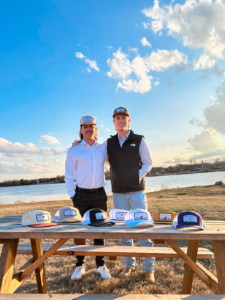 Long before Holden Rook and Brooks Gay were assigned a project in their entrepreneurship class requiring them to start a business, the roommates had already discussed starting their own venture.
Long before Holden Rook and Brooks Gay were assigned a project in their entrepreneurship class requiring them to start a business, the roommates had already discussed starting their own venture.
So when the class project met reality, they already had their plan ready.
Rook – a sophomore marketing major from The Woodlands – said the class brainstormed for “about 2-3 weeks” and then had to pitch the idea to Dr. Jim Litton, associate professor of Management Sciences and Director of the Griggs Center for Entrepreneurship & Philanthropy, who was teaching the entrepreneurship class.
“Brooks and I had expressed an interest in doing something before the class had even started, but it was Brooks who kick-started the idea in class,” Rook said. “Brooks was the brains behind the start of it since he’s from Abilene and knew the ins and outs of how to get our business started here locally.”
And that’s how Abilene Hat Company was born.
Gay – a junior business management major from Abilene – is a former baseball player at Abilene Wylie High School and last season at ACU, who had the original idea for a hat company.
“I wanted to create a hat company that represents Abilene and the surrounding areas because of the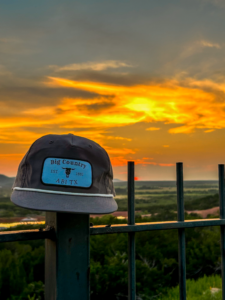 number of people who wear hats and how much pride people have in being from this area,” Gay said.
number of people who wear hats and how much pride people have in being from this area,” Gay said.
After making their pitch to Litton, getting approval, putting together a team, and dividing up responsibilities, the team – consisting of Gay, Rooks, ACU volleyball player Ashli Edmiston, Reece Westby, and Nick Schott – met about logistics and designs and began the process of giving life to the company.
“Our goal was to, first, make a good grade in the class,” Gay said. “We talked about our vision, bounced ideas off each other, and set our goals higher. We wanted to create the most revenue and profit in the current class and break the current record for revenue and profit ever in that class. We broke the current records and created the most revenue to date.”
The team is now just Gay and Rook, and they have moved the business forward to the point that they have a sales point online and in a storefront at Covey Apparel in Terrell, Texas.
“Our short-range goal was to find some local businesses willing to support another small business and give us a chance to get into their stores,” Rook said. “The long-term goal is to expand into all of West Texas to allow many people to see our brand.”
 The company’s most popular hat logo is a patch on a rope cap with the words “West Texas” atop a pump jack, an iconic symbol of one of the lifebloods of West Texas life.
The company’s most popular hat logo is a patch on a rope cap with the words “West Texas” atop a pump jack, an iconic symbol of one of the lifebloods of West Texas life.
“One of our long-term goals is to create different pieces of apparel with similar ideas and designs,” Gay said. “I want to represent where we are from, the pride the people of West Texas have by capturing those feelings and displaying them on a high-quality product. I believe the patch design with the oil rig does the best job of capturing the spirit of the hard-working people of West Texas.”
Gay and Rook said their COBA classes have given them insight into so many different aspects of running a business, from the entrepreneurial mindset to all the areas of running a company.
“The most beneficial things I’ve learned have been small pieces from numerous classes,” Gay said. “We use Excel to keep our books, we use marketing strategies in our social media, and many other entrepreneurship techniques from the classes I have taken.”
Rook echoed some of that when describing what he’s learned inside the walls of the Mabee Business Building.
“Definitely learned more about the entrepreneurial mindset,” Rook said. “You must be ready to adapt to the market and whatever it’s feeding you to succeed. Everything is always changing, and you must be ready to change.”
While Rook said the next stop is continued growth and perhaps adding additional employees, Gay said he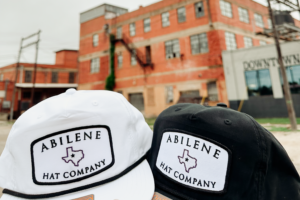 wants to expand the business into collegiate athletics, where Name, Image and Likeness (NIL) now allows student-athletes to promote products in exchange for money.
wants to expand the business into collegiate athletics, where Name, Image and Likeness (NIL) now allows student-athletes to promote products in exchange for money.
“That would not only be mutually beneficial for us and the student-athlete but will also significantly push our brand,” Gay said. “The athletes we are connected with at large schools have significant social media presence and will grow our total audience.”
To learn more about entrepreneurship at ACU, click here.
by M. C. Jennings | Jan 31, 2024 | Academics, Alumni Spotlight, Athletics, Careers In..., COBA Faculty, College Decisions, Management
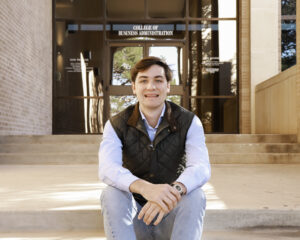 Growing up in Spain, Matias Montanes (‘23) knew he wanted to play tennis and play at the professional level. Spain is the home of great champions like current world No. 2 Carlos Alcaraz, 22-time Grand Slam champion Rafael Nadal, former world No. 1 Juan Carlos Ferrero, and doubles great Emilio Sanchez.
Growing up in Spain, Matias Montanes (‘23) knew he wanted to play tennis and play at the professional level. Spain is the home of great champions like current world No. 2 Carlos Alcaraz, 22-time Grand Slam champion Rafael Nadal, former world No. 1 Juan Carlos Ferrero, and doubles great Emilio Sanchez.
It’s a country steeped in tennis tradition, and Montanes wanted to be part of it. He began playing at a young age, and by the time he was 12, he was winning tournaments and was one of the top young players in his home country.
However, the time spent practicing took him away from other interests and made him realize that the dream of playing as a professional might not be what he wanted after all. He began to think about playing collegiately and pursuing his other dreams, like a college degree and perhaps a career as a lawyer.
That’s when he called ACU men’s head coach Juan Nunez (’09), and as soon as the two made a connection, Montanes knew he had found a new home. But two months before he was to arrive in Abilene for the start of his freshman year in the fall of 2020, he suffered a catastrophic elbow injury in a bike accident in Spain.
He came to ACU with the injury and Nunez honored his scholarship despite knowing that doctors in Spain said Montanes wouldn’t be able to play at a competitive level again. He tried to rehab the injury through the fall, but in December, he gave up tennis and began looking to return home to attend college in Spain.
But that’s when Nunez intervened and set Montanes on a path to something he truly loves: the law. As Matias explored this new road, he found mentors in faculty from ACU and COBA, especially Dr. Phil Vardiman (‘76) and Daniel Garcia (‘07). He graduated in December with a Bachelor of Business Administration (BBA), majoring in management with a minor in business leadership. Mattias has returned to Spain to study law in hopes that one day he can combine his ACU business degree with his law degree.
We recently talked to Matias and asked about his time as a tennis player, his experience at ACU and in COBA, and what’s next for him.
Q: Tell me about growing up in Spain, where you grew up, and what you wanted to be as an adult.
Montanes: I grew up in Menorca, Spain, and started playing tennis when I was four. My family and I moved to Mallorca when I was 10 because of my dad’s job. But that helped me improve my tennis game because I could practice with better tennis players and play at a good club.
Q: Growing up in Spain and playing tennis, did you have dreams of one day becoming the next Nadal or one of the other great players from Spain?
Montanes: When I was 12, I started to win Spanish and European championships. I was in the top three in Spain and maintained that level until I was 16. During that time, I beat players like Carlos Alcaraz (he’s number 2 in the world now), Arthur Cazaux (number 122 ATP right now), and Pablo Llamas (160 ATP right now). I wanted to be a professional tennis player, and that was everything I was seeing in my future. I practiced five hours per day every day of the week for six years. When I turned 17, I finally realized how hard it was to become a professional tennis player.
Q: Was tennis always the way you planned to get your education, and how did you come to learn about ACU?
Montanes: I had a hard-working mentality during my career, but that’s not enough. You must have something special, but I didn’t have it to get to that next level. I started to look for universities in the United States after I realized that. I had to find other goals in my life other than tennis. Tennis wasn’t going to provide me with a living. I started talking to some colleges, but as soon as I spoke with Juan Nunez, I knew that ACU was the place to go. Two months before I arrived at ACU, I had a bike accident, breaking my elbow into 18 pieces. The doctors had to put me in a cast and warned me that I wouldn’t be able to play tennis anymore. I didn’t want to believe them. I called Juan, and he didn’t believe them either. I traveled to Texas and visited more doctors. We had faith, but that wasn’t enough. I started to play tennis, and my elbow was getting worse every day. In December 2020, I decided to stop and start looking for colleges in Spain, but Juan allowed me to be his assistant coach, maintaining my scholarship.
Q: What were your first impressions of ACU and Abilene, and how did those change during the years you were here?
Montanes: My first semester, I didn’t like ACU. I came from the Catholic Church, and it was a change. I wanted to return to Spain; I had all my family, friends, and girlfriend there, but the opportunity Juan gave me was too big; one of those opportunities that only happens once in your life. Finally, I decided to stay. My tennis career changed in January 2021 when I started coaching as a freshman. As a second-year student, I began studying law in Spain, thanks to an online program. Being an assistant, attending Business school at ACU, and law school in Spain wasn’t easy, but I made it through.
Q: I know Dr. Phil Vardiman and Daniel Garcia were integral in your pursuit of a business management degree. Can you expound on how much those two men have impacted your life?
Montanes: I was lucky to have professors like Dr. Vardiman and Daniel. We made a special connection from the beginning. They knew everything I was going through and always supported me. They taught me life lessons without words but facts.
Q: What was the total COBA experience like for you, and what lessons did you learn that will stay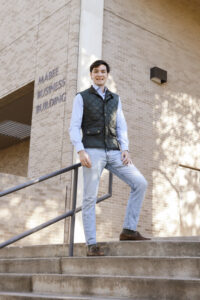 with you?
with you?
Montanes: I learned to be a servant business leader, a lesson I will always carry. I realized how good people can be in this world. Before coming to ACU, I never thought that people like this existed. But, thanks to ACU, I know the kind of husband, dad, and son I want to become. It took me some years, but now I’m conscious about it.
Q: How did you become interested in studying the law, and what kind of law degree are you working toward in Spain?
Montanes: I was always interested in law. If I had to choose a major in Spain, it would have been law. I saw the opportunity when I became an assistant because I wasn’t arriving home tired. I was coaching, not practicing. I think both majors (business and law) combine very well. You’d better know the law if you have your own business.
Q: How will you use your law degree, and do you want to merge your ACU degree with your law degree in your professional career?
Montanes: I’d like to find a business job with a multinational company and see how it looks in practice. Once I graduate from law school, I will decide whether to become a lawyer or use my law knowledge in a business position.
Q: What is the one thing you miss about Texas and ACU?
Montanes: The people. I miss the people at ACU and in Texas.
by M. C. Jennings | Dec 21, 2023 | Academics, COBA Faculty, Current Students, Marketing, Student Spotlights, Uncategorized
written by special contributor, Lance Fleming
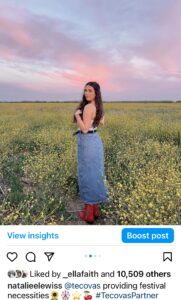 The pandemic of 2020 wreaked havoc on the global economy, shut down businesses and schools, drove employees to home offices, separated friends and family, and took most people away from their routines.
The pandemic of 2020 wreaked havoc on the global economy, shut down businesses and schools, drove employees to home offices, separated friends and family, and took most people away from their routines.
But in ways no one considered before COVID, it brought families closer together, allowed everyone to slow down and take care of themselves and each other, and gave everyone time to reflect and think. It’s also when Natalie Lewis decided on a career path.
During those days spent sitting in her parents’ home in The Woodlands, she turned to YouTube videos to pass the time. She focused on fashion and lifestyle YouTubers, which led her to follow those influencers on Instagram. That’s when she put the pieces together.
“I noticed those individuals had made a career out of creating content for their audience and brands that they love,” said Lewis, a senior marketing major from The Woodlands. “I knew that would be something I would love to do, so I decided to give it a shot.”
Lewis began her own Instagram page (@natalieelewiss), which not only chronicles her life, but also allows her to pass along lifestyle and fashion advice. She engages with other influencers through YouTube and Instagram, which she says is her favorite platform. That’s why she started on Instagram but will expand to YouTube after she graduates in May.
Her parents, Colter (‘95) and Elizabeth (‘96), have supported her post-college career decision, especially after she’s seen so much success – almost 15,000 followers – early in the process. Her mother helps Lewis create content, and her father helps her think through all the logistics of payment and pitching herself to different brands.
“My parents have watched my gradual build-up from simply getting free products to getting paid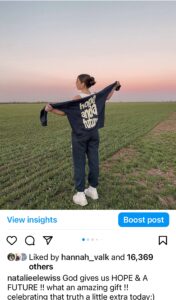 campaigns, and they were able to understand it better,” Lewis said. “They saw the hard work I put in behind the scenes of growing my platform and gained more respect for what I wanted to do. When I told them I wanted to pursue this career, they already understood it and saw that influencing is a fast-growing industry.”
campaigns, and they were able to understand it better,” Lewis said. “They saw the hard work I put in behind the scenes of growing my platform and gained more respect for what I wanted to do. When I told them I wanted to pursue this career, they already understood it and saw that influencing is a fast-growing industry.”
The influencer industry is relatively new, and she said the most important piece is finding a niche, a target audience, a social media platform that resonates with the audience, and constantly revamping the platforms for consistency. Lewis began slowly, posting outfit photos on Instagram because she wanted to step into the world of fashion content.
That made it easier to get brand collaborations from companies, who would look at her feed and see that her content aligned with their brand.
“Once I branded my Instagram, I started reaching out to small clothing brands and got rejected by some and accepted by others,” Lewis said. “Once companies had seen my work with other brands, they became more interested in working with me because of my credibility. And that has led me to work with bigger brands.”
 Lewis didn’t have a marketing plan when she started, just a passion for fashion and taking pictures. She began posting for fun because she was curious where the posts might lead. When Lewis found her passion, she researched how to grow her account and work with different brands. She didn’t write a marketing plan until her junior year at ACU.
Lewis didn’t have a marketing plan when she started, just a passion for fashion and taking pictures. She began posting for fun because she was curious where the posts might lead. When Lewis found her passion, she researched how to grow her account and work with different brands. She didn’t write a marketing plan until her junior year at ACU.
Lewis said no follower count or income level is required to be considered an influencer. Consistency in posting and connecting with the community, Lewis said, are most important in building a career as an influencer.
“It’s a mindset,” Lewis said. “If you want to be an influencer, you have to post like one, which is awkward at first. But you get used to it. I got my first brand deal with 3,000 followers and have seen many other creators work with brands with only 1,000 followers. You can be an influencer with only 1,000 followers and earning no money, just as long as you’re actively pursuing influencing. In my first year of content creation, I only received free products and earned no money. Consistency, engagement rate, community, and trustworthiness are how I would measure whether someone is an influencer.”
Her education in COBA, she said, has helped her learn how to market herself, implement those plans, and measure the growth of her brand.
“I’ve had a tremendous opportunity to build relationships with so many professors who have helped me with this venture, specifically Dr. Jennifer Golden,” Lewis said. “She has helped me with my professional goals within the influencing industry. COBA has taught me how to market myself on social media. The biggest lessons I’ve learned are about personal branding, which is a crucial topic in the influencing industry because it sets one apart from millions of other influencers. The models and plans I’ve been taught in COBA have influenced my decision-making, steering me where I want to take my social media.”
with this venture, specifically Dr. Jennifer Golden,” Lewis said. “She has helped me with my professional goals within the influencing industry. COBA has taught me how to market myself on social media. The biggest lessons I’ve learned are about personal branding, which is a crucial topic in the influencing industry because it sets one apart from millions of other influencers. The models and plans I’ve been taught in COBA have influenced my decision-making, steering me where I want to take my social media.”
After she graduates from ACU, Lewis said she looks forward to expanding her niche into more lifestyle-based content (bridal, newly married, interior design, daily routine, family, etc.). She also said she wants to focus more on growing and creating the content she truly loves while continuing to create fashion content.
“I’m going to get a job after graduation while pursuing influencing on the side,” Lewis said. “However, I’m going to work hard to grow my platforms so that one day I’ll be able to quit my job and focus on influencing full-time. Creating content for my audience and working with brands I love is my biggest passion, so the end goal is to go into influencing full-time one day.”
by M. C. Jennings | Dec 12, 2023 | Academics, Alumni Spotlight, COBA Events, COBA Faculty, Uncategorized
Written by special contributor Lance Fleming
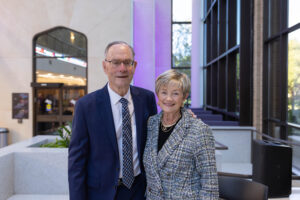
Dr. Bill and Mrs. Donna Petty
If – as ACU President Dr. Phil Schubert (’91) said on Friday, Oct. 13 – the College of Business Administration has been an engine that has driven ACU’s extraordinary growth over the last 35-plus years, then the man who put the key in the ignition was Dr. Bill Petty (’64).
So, it was only natural that when the Mabee Business Building – which Petty and others planned, raised money for and saw through to its opening in 1986 – needed a facelift, Petty’s name would adorn one of the newly remodeled areas of the facility.
And that’s why Schubert, Petty and his wife Donna (Guinn ’64), ACU Dean of COBA Brad Crisp (’93), and numerous family and friends were on hand the Friday afternoon of Homecoming 2023 in the Mabee Business Building to celebrate the grand reopening of the Bill and Donna Petty Atrium.
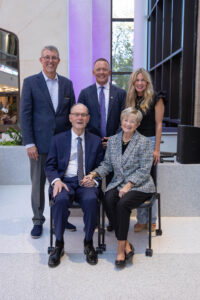
Dr. Brad Crisp, Dr. Phil Schubert, Kelly Shewmaker, Bill and Donna Petty
The atrium renovation is part of a multi-million-dollar upgrade of the building that opened in 1986, allowing business classes to move out of the Hardin Administration Building and into a modern facility. The renovation project began out of the need to replace the heating, ventilation, and air conditioning system in 2020. Still, it grew to involve all major spaces inside the building – including classrooms, labs, offices, and the atrium, which reopened this semester after four summers of construction.
The Bill and Donna Petty Atrium features upgraded technology and appearance to better welcome students, faculty, staff, alumni, and business and technology leaders into the building and facilitate networking between these groups.
The atrium project was made possible thanks to a generous lead gift from an anonymous donor and substantial commitments from family and friends. It also received significant support during the ACU Gives event last April 25-26, when dozens of donors – many of whom the Pettys mentored – contributed an additional $100,000 toward the $1.4 million renovation.
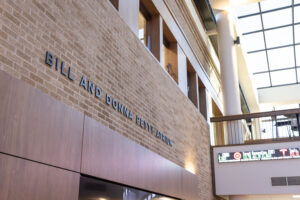 But the project got its push in 2020 when Crisp began meetings and conversations about the viability of raising the necessary money amid a global medical emergency.
But the project got its push in 2020 when Crisp began meetings and conversations about the viability of raising the necessary money amid a global medical emergency.
“I vividly remember conversations with some of our key donors just as the pandemic hit in 2020, and I asked them if we should continue with the project,” Crisp said at the dedication ceremony. “And 18 families gave us the courage to fund the first phase and tell us it was time to move forward. Across the four phases, we had more than 280 donor families contribute more than $3.4 million toward the total cost of almost $9 million.”
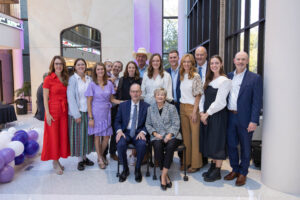
The Petty Family
But when it comes to COBA and the Pettys, that should come as no surprise. COBA has been a catalyst for the remarkable growth of the university and its global reputation since the Mabee Business Building opened to students 37 years ago.
Petty was called back to ACU from Texas Tech in 1979 and became the founding dean of COBA in 1981. The newly formed college set up shop in the administration building, which hosted Bible classes and other programs at the time, putting available space at a minimum.
“We didn’t have room to grow, and it was limiting the number of students we could support,” Petty said in an article in the Spring-Summer 2023 issue of ACU Today.
That’s when Petty went to work, calling on friends and alums alike to raise the necessary money to build the Mabee Business Building. He has often given credit to Jozell Brister (’61), associate professor emerita of management sciences and former associate dean of COBA, and other dedicated faculty members.
But it was Petty who pushed, prodded, and cajoled to raise the money the university needed. The generosity of alumni and friends and a lead gift from the Mabee Foundation made the building a reality. And once the building opened, Petty, the faculty he hired, and the students he and other outstanding faculty taught helped propel the university to greater heights.
“Over the last 30 or 40 years, the College of Business Administration has been an engine for Abilene Christian University, fueling the trajectory of growth and escalation that we have enjoyed,” Schubert said. “That would not have been the case without the bold vision that Bill Petty brought to ACU, seeing all that could be in front of him with Donna by his side supporting him to bring that bold vision to reality.
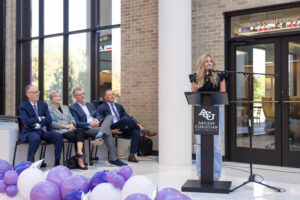 Another former student, Kelly (Stites ’91) Shewmaker, brought a calculator to the ceremony, the same one she used in Petty’s Financial Management class. The same calculator she thought would help her cruise through the course.
Another former student, Kelly (Stites ’91) Shewmaker, brought a calculator to the ceremony, the same one she used in Petty’s Financial Management class. The same calculator she thought would help her cruise through the course.
“I have this Hewlett-Packard 12C calculator that I used as a student,” she said at the ceremony. “I was convinced that it would be an easy A class after I found out you could calculate every answer to every question. But on the first day of class, Dr. Petty told us that for every test and every problem, we would be using the HP 12C. Then, we would have to calculate it by hand to show that we knew how to use the technology, calculate every problem by hand, and understand the calculations. I kept that HP 12C calculator as a trophy of sorts because I survived his class.”
In his brief remarks at the ceremony, Petty once again thanked Brister, his classmates, and friends Jack Griggs (’64) and Dr. John C. Stevens (’38) for persuading him to leave Texas Tech and return to ACU to be part of the business faculty. He also recalled the numerous times he and his wife hosted students in their home over the years, building the kind of relationships that would lead to two former students thanking him from the podium and many others attending the ceremony.
“I never felt more called by God than when I was called to return to ACU,” Petty said. “Those were 10 ½ of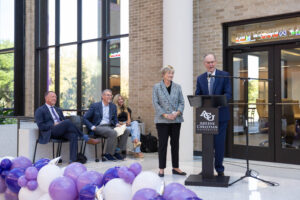 the best years of our lives. We raised our children in the shadow of ACU, and then they went to school here, so they have a deep love for ACU just like we do.”
the best years of our lives. We raised our children in the shadow of ACU, and then they went to school here, so they have a deep love for ACU just like we do.”
And, it’s that deep love for ACU and sense of calling that Petty passed along to his students, including Schubert.
“I tell people all the time that I had the best experience anyone possibly could have had at ACU,” Schubert said. “I found people here at ACU, especially in the College of Business Administration, specifically people like Bill Petty, who saw things I didn’t see in myself. I found people who challenged me and encouraged me to be more like who God called me to be. My guess is that many others would tell the same story about the transformation that took place because they had people like Bill and Donna come alongside them and encourage them to be more like the people that God had called them to be. We’re all so incredibly grateful for them both. We’re grateful for their example of selfless service, amazing generosity, and bold vision to be more of who God calls us all to be.”
Note: Some information from this story appeared in the Spring-Summer 2023 issue of ACU Today.
by M. C. Jennings | Nov 28, 2023 | Academics, Alumni Spotlight, COBA Faculty, College Decisions, Current Students, Economics, Faith Infusion, Social Entrepreneurship, Uncategorized
Written by special contributor Lance Fleming
Costa Rica, a small Central American country, is experiencing a significant increase in tourism. Travel officials in Costa Rica expect an unprecedented surge in tourists in 2023 and 2024. This country is famous for its national parks, rainforests, beaches, wildlife, and outdoor activities.
ACU students in the College of Business Administration have been traveling to Costa Rica since an initial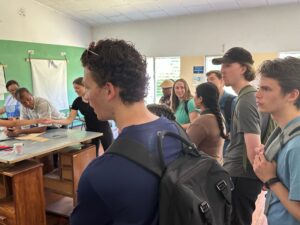 Central America Study Abroad trip with Dr. Mark and Dr. Laura Phillips in 2016. In 2018, they traveled to Turrialba, Costa Rica to visit CATIE, an agricultural university with a focus on economic development. In 2019, the first Social Enterprise Consulting class was offered and the partnership with CATIE began, focusing on economic development. But those students aren’t just in Costa Rica to observe. They are learning practical skills in research, marketing, and product creation from a class taught by Dr. Laura Phillips, Dr. Sarah Easter, Dr. Jennifer Golden, Dr. Mark Phillips, and Daniel Garcia. Currently, the class is working with local entrepreneurs to launch products made from materials donated by Southwest Airlines.
Central America Study Abroad trip with Dr. Mark and Dr. Laura Phillips in 2016. In 2018, they traveled to Turrialba, Costa Rica to visit CATIE, an agricultural university with a focus on economic development. In 2019, the first Social Enterprise Consulting class was offered and the partnership with CATIE began, focusing on economic development. But those students aren’t just in Costa Rica to observe. They are learning practical skills in research, marketing, and product creation from a class taught by Dr. Laura Phillips, Dr. Sarah Easter, Dr. Jennifer Golden, Dr. Mark Phillips, and Daniel Garcia. Currently, the class is working with local entrepreneurs to launch products made from materials donated by Southwest Airlines.
Dr. Mark Phillips and Garcia will teach the class next semester, and then Easter and Golden will teach a summer course. Students in each class will go over topics teaching them how to be a consultant, how to help without hurting, Costa Rican culture (both generally and in the business world), and some project-specific topics.
During Spring Break, the spring semester class will be in Costa Rica, and afterward, they will focus on completing their deliverable to the client for the rest of the semester. Dr. Laura Philips said the summer class will have a different format. It will include 5-6 weeks of online content on the same topics as in the spring. After that, students will spend nearly two weeks in Costa Rica to work on the project.
AACSB (the Association to Advance Collegiate Schools of Business) seeks to encourage all accredited schools to make a societal impact. As they state on their website, “AACSB’s vision of societal impact is that business schools contribute their specialized expertise to help mitigate some of society’s most pressing economic, social, human, and environmental problems.”
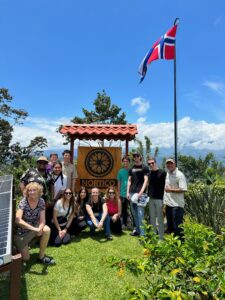 COBA was already seeking to make a broader societal impact through their programs. Now the Costa Rica activities are part of a broader COBA initiative. Dr. Laura Phillips said, “It’s exciting because AACSB is now asking us to do more of what we were already doing. The change isn’t to the consulting class. What’s different now is that we will have more activities (curricular, research, and engagement) focused on the same theme of Increasing Educational and Economic Opportunities for People in Marginalized Groups.”
COBA was already seeking to make a broader societal impact through their programs. Now the Costa Rica activities are part of a broader COBA initiative. Dr. Laura Phillips said, “It’s exciting because AACSB is now asking us to do more of what we were already doing. The change isn’t to the consulting class. What’s different now is that we will have more activities (curricular, research, and engagement) focused on the same theme of Increasing Educational and Economic Opportunities for People in Marginalized Groups.”
A five-person committee began meeting earlier this year to come up with a theme for the college’s work, Increasing Educational and Economic Opportunities for People in Marginalized Groups, and a tentative five-year plan.
“The plan includes curricular, research, and engagement objectives for our residential and online campuses,” Dr. Phillips said. “The Costa Rica class is one piece of this plan. We want the societal impact plan to provide opportunities for all interested faculty and staff to be involved, and that is part of the reason we are expanding the faculty who teach the consulting class. The plan also includes the development of additional partners for consulting projects. We are interested in developing a second international partner as well as cultivating a partnership closer to home.”
When Dr. Phillips first visited the CATIE campus with students in 2018, she connected with Dr. Eliecer Vargas, an economist at CATIE who specializes in economic development, which aligns well with the COBA students’ focus in Costa Rica.
Five years ago, students spent a few days exploring tourism startups by rural female entrepreneurs in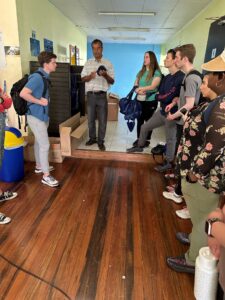 towns near Turrialba. After their trip, Dr. Phillips and Dr. Easter approached Vargas to discuss the idea of starting a consulting class and having the group of female entrepreneurs as their first client. Vargas agreed, and Dr. Phillips and Dr. Easter took their first group of consulting students to Costa Rica in the spring of 2019.
towns near Turrialba. After their trip, Dr. Phillips and Dr. Easter approached Vargas to discuss the idea of starting a consulting class and having the group of female entrepreneurs as their first client. Vargas agreed, and Dr. Phillips and Dr. Easter took their first group of consulting students to Costa Rica in the spring of 2019.
Southwest Airlines has served as the air provider for ACU’s program, transporting students and professors to and from Costa Rica, and in 2022, Southwest Airlines arranged a deal with CATIE to give the university seats from their refurbished planes.
The Turrialba region is now a major focus of Southwest’s investments. The company has set up a leatherworking shop on campus where local women and men can receive training and have access to leather and high-quality sewing machines with their support.
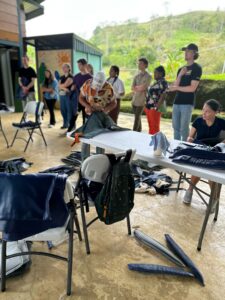 As part of Southwest Airlines’ “Repurpose with Purpose” program, each of the company’s fleet of airplanes is overhauled every four years, and as a part of that process, the seat leather is replaced. The leather pulled out of the planes is donated to nonprofit organizations for upcycling projects.
As part of Southwest Airlines’ “Repurpose with Purpose” program, each of the company’s fleet of airplanes is overhauled every four years, and as a part of that process, the seat leather is replaced. The leather pulled out of the planes is donated to nonprofit organizations for upcycling projects.
The idea is to create a business incubator to launch businesses as people graduate from the training program. Jobs are also being created in rural communities because CATIE receives intact seat covers that must be deconstructed before they are upcycled into new products.
And that’s where the ACU students enter the picture.
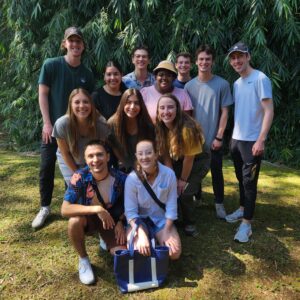 The students’ client is called Wearsos – the first business to come out of the leather project – and it was started by the husband-and-wife duo of Lynne Corvaglia and Chris Riquelme. Aside from upcycled bags, the company also plans to make other products like passport holders, wallets, luggage tags, and shoes.
The students’ client is called Wearsos – the first business to come out of the leather project – and it was started by the husband-and-wife duo of Lynne Corvaglia and Chris Riquelme. Aside from upcycled bags, the company also plans to make other products like passport holders, wallets, luggage tags, and shoes.
No two trips to Costa Rica have been alike, with the specifics of the project changing with every trip, usually at the request of the client. That means the specific business topics the students focus on vary.
“They always learn something from the business side of the project, although the bigger learning outcomes stem from the nature of cross-cultural consulting,” Dr. Phillips said. “The students have to stretch their problem-solving and critical-thinking skills and they have to do that in a group setting and not just on their own. Their flexibility and adaptability are put to the test every day we are there.
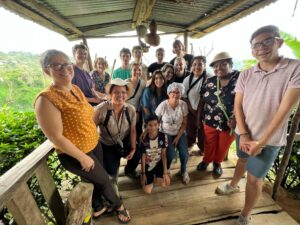 “They learn that other cultures may have different objectives and priorities for their business than what they usually see in the U.S., and they learn that the American measures of success are not the only measures,” she said. “They also learn that to provide useful recommendations for the client, they have to truly understand the client’s objectives and tailor their business solutions to meet the needs and the desires of the clients.”
“They learn that other cultures may have different objectives and priorities for their business than what they usually see in the U.S., and they learn that the American measures of success are not the only measures,” she said. “They also learn that to provide useful recommendations for the client, they have to truly understand the client’s objectives and tailor their business solutions to meet the needs and the desires of the clients.”
From the business skill side, Dr. Phillips said, the students have worked on market assessments and provided feedback based on the personas of different target customers. One class conducted focus groups to provide market research on potential products. Classes have researched logistics to help the client as they prepare to ship goods from Costa Rica to the US and Canada.
Other students created a comprehensive marketing plan (Instagram and Facebook posts, email campaigns,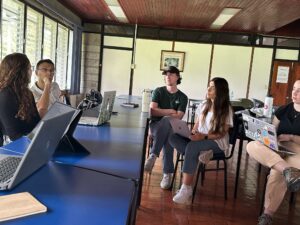 etc.) to help a client roll out a Kickstarter campaign. Students listened to entrepreneurs talk about current and future product ideas as well as where and how they intend to sell and then provided a comprehensive list of questions to each entrepreneur to help them think through and further develop their business plans.
etc.) to help a client roll out a Kickstarter campaign. Students listened to entrepreneurs talk about current and future product ideas as well as where and how they intend to sell and then provided a comprehensive list of questions to each entrepreneur to help them think through and further develop their business plans.
Dr. Phillips said proposed expansion plans for the program that have been discussed are for the Costa Rica consulting class to be offered twice each year: once in the spring and once in the summer with a variety of faculty involved in teaching the class. Dr. Phillips also said she would like to involve COBA alumni on the trip to provide their expertise in the project’s area of focus.
“That could be social media marketing, logistics, building basic business plans, finding funding sources, or rural development,” she said. “I also hope to continue our partnership with Southwest Airlines. It has been valuable to be working with their Repurpose with Purpose group because we can truly partner to support these clients.”
To learn more about the College of Business at ACU, click here.
by M. C. Jennings | Nov 2, 2023 | Academics, Accounting, Careers In..., COBA Events, COBA Faculty, COBA Staff, College Decisions, Current Students, Outcomes, Professional Development, Uncategorized
written by special contributor Lance Fleming
Each year, ACU’s College of Business Administration (COBA) graduates students ready to move into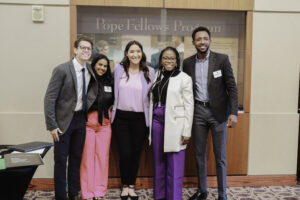 professional fields in numerous types of businesses at every level of an organization. Sometimes, it’s in a company run by an ACU alum who wants to help students at their alma mater secure employment. Other times, it’s a global brand looking for the best and the brightest employees.
professional fields in numerous types of businesses at every level of an organization. Sometimes, it’s in a company run by an ACU alum who wants to help students at their alma mater secure employment. Other times, it’s a global brand looking for the best and the brightest employees.
Whatever the case might be and whatever employers are looking for, more often than not, ACU graduates – and in particular, ACU COBA graduates – are usually at the head of the line when it comes to new hires each summer.
So it shouldn’t be surprising that more than 50 companies from across the state and Oklahoma were represented on Thursday, Oct. 5, for the first joint Career Fair sponsored by COBA and the Department of Engineering and Physics at the Hunter Welcome Center. COBA also has in-house career preparation led by Professional Development and Internship Director Jasmine McCabe-Gossett. Students also have access to the ACU Virtual Career Center with resources to help them create resumes and cover letters.
McCabe-Gossett (2010), who joined COBA last year, sensed a need for a Career Fair. After months of preparation, on October 5, that happened giving COBA students a chance to sit across from potential employers, put their resumes in front of them, and allow them to talk about themselves and what skills they would bring to an organization.
 Various companies with both a local and international presence participated in the fair, providing our students with options that appealed to all. Business and technology students were able to engage with companies within the following industries: real estate, hospitality, IT services, consulting, distribution, financial services, sales, healthcare and more. One student noted, “I have never attended a career fair, but it was great! It was so cool to be able to see many different options in internships, companies, and people!”
Various companies with both a local and international presence participated in the fair, providing our students with options that appealed to all. Business and technology students were able to engage with companies within the following industries: real estate, hospitality, IT services, consulting, distribution, financial services, sales, healthcare and more. One student noted, “I have never attended a career fair, but it was great! It was so cool to be able to see many different options in internships, companies, and people!”
These companies weren’t just looking for full-time employees, either. Internships have become a way for companies to put a student and potential future employee through an on-the-job interview, a point McCabe-Gossett tried to drive home to some of her students going into the Career Fair.
“We want to connect students with employers, especially students looking for full-time employment,” she said. “But a considerable focus is to connect employers to potential interns. In the lead-up to the event, we hosted several different workshops to help students feel comfortable and confident, starting with a workshop focused on identifying personal values and what it looks like to live out your faith in the workplace authentically. We had a panel of professionals who came in and spoke about that.
“The Career Fair turned out to be geared more toward internships,” McCabe-Gossett said. “During this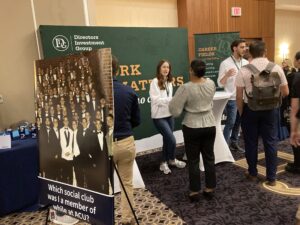 season, many companies are laying off employees, but we know it’s still strategically important to build a pipeline, and internships are a big part. I told the students not to dismiss the internship experience because it’s a great foundation\opportunity that can open doors for them. Some students were disappointed, but I tried to help re-frame their thinking regarding how you leverage an internship.”
season, many companies are laying off employees, but we know it’s still strategically important to build a pipeline, and internships are a big part. I told the students not to dismiss the internship experience because it’s a great foundation\opportunity that can open doors for them. Some students were disappointed, but I tried to help re-frame their thinking regarding how you leverage an internship.”
Another area where McCabe-Gossett and others helping her with the Career fair tried to re-form thinking centered around the experiences students might have working as interns or part-time workers at faith-based camps or events. While that experience fits neatly into the ACU experience, sometimes it doesn’t catch the eye of a potential employer, something McCabe-Gossett said she tried to help some students with as they prepare themselves to hit the job market.
“A lot of times, our students have faith-based experiences, so we talked about how to translate those experiences to a compelling resume and what values they can bring to the workplace,” she said. “Those are wonderful experiences, but we also want our students to be able to go toe-to-toe with anyone for any job. This is beyond talking about what you did but digging into how you did your job and the result.”
And this year’s success has McCabe-Gossett already thinking about the 2024 Career Fair.
 “We’ve had Meet the Firm Nights in the past, which was specific to accounting majors, and that’s wonderful,” she said. “But I wanted to cast a wider net this year and probably a wider one next year. It was a heavy lift, but I’m glad we did it because I now have this Career Fair to show potential employers. We have ACU alumni who are killing it in the business world, and they’re in positions of power, so why not ask them to come back here and represent their companies? I’m trying to create a playbook to present to alumni who work at Google or AT&T or wherever to help convince them they should come back here and represent their company at future events.”
“We’ve had Meet the Firm Nights in the past, which was specific to accounting majors, and that’s wonderful,” she said. “But I wanted to cast a wider net this year and probably a wider one next year. It was a heavy lift, but I’m glad we did it because I now have this Career Fair to show potential employers. We have ACU alumni who are killing it in the business world, and they’re in positions of power, so why not ask them to come back here and represent their companies? I’m trying to create a playbook to present to alumni who work at Google or AT&T or wherever to help convince them they should come back here and represent their company at future events.”
For more information on professional development in COBA, email Jasmine McCabe-Gossett at jcj05c@acu.edu.
 Long before Holden Rook and Brooks Gay were assigned a project in their entrepreneurship class requiring them to start a business, the roommates had already discussed starting their own venture.
Long before Holden Rook and Brooks Gay were assigned a project in their entrepreneurship class requiring them to start a business, the roommates had already discussed starting their own venture. number of people who wear hats and how much pride people have in being from this area,” Gay said.
number of people who wear hats and how much pride people have in being from this area,” Gay said. The company’s most popular hat logo is a patch on a rope cap with the words “West Texas” atop a pump jack, an iconic symbol of one of the lifebloods of West Texas life.
The company’s most popular hat logo is a patch on a rope cap with the words “West Texas” atop a pump jack, an iconic symbol of one of the lifebloods of West Texas life. wants to expand the business into collegiate athletics, where Name, Image and Likeness (NIL) now allows student-athletes to promote products in exchange for money.
wants to expand the business into collegiate athletics, where Name, Image and Likeness (NIL) now allows student-athletes to promote products in exchange for money. Growing up in Spain, Matias Montanes (‘23) knew he wanted to play tennis and play at the professional level. Spain is the home of great champions like current world No. 2 Carlos Alcaraz, 22-time Grand Slam champion Rafael Nadal, former world No. 1 Juan Carlos Ferrero, and doubles great Emilio Sanchez.
Growing up in Spain, Matias Montanes (‘23) knew he wanted to play tennis and play at the professional level. Spain is the home of great champions like current world No. 2 Carlos Alcaraz, 22-time Grand Slam champion Rafael Nadal, former world No. 1 Juan Carlos Ferrero, and doubles great Emilio Sanchez. with you?
with you?
 campaigns, and they were able to understand it better,” Lewis said. “They saw the hard work I put in behind the scenes of growing my platform and gained more respect for what I wanted to do. When I told them I wanted to pursue this career, they already understood it and saw that influencing is a fast-growing industry.”
campaigns, and they were able to understand it better,” Lewis said. “They saw the hard work I put in behind the scenes of growing my platform and gained more respect for what I wanted to do. When I told them I wanted to pursue this career, they already understood it and saw that influencing is a fast-growing industry.” Lewis didn’t have a marketing plan when she started, just a passion for fashion and taking pictures. She began posting for fun because she was curious where the posts might lead. When Lewis found her passion, she researched how to grow her account and work with different brands. She didn’t write a marketing plan until her junior year at ACU.
Lewis didn’t have a marketing plan when she started, just a passion for fashion and taking pictures. She began posting for fun because she was curious where the posts might lead. When Lewis found her passion, she researched how to grow her account and work with different brands. She didn’t write a marketing plan until her junior year at ACU. with this venture, specifically Dr. Jennifer Golden,” Lewis said. “She has helped me with my professional goals within the influencing industry. COBA has taught me how to market myself on social media.
with this venture, specifically Dr. Jennifer Golden,” Lewis said. “She has helped me with my professional goals within the influencing industry. COBA has taught me how to market myself on social media.

 But the project got its push in 2020 when Crisp began meetings and conversations about the viability of raising the necessary money amid a global medical emergency.
But the project got its push in 2020 when Crisp began meetings and conversations about the viability of raising the necessary money amid a global medical emergency.
 Another former student, Kelly (Stites ’91) Shewmaker, brought a calculator to the ceremony, the same one she used in Petty’s Financial Management class. The same calculator she thought would help her cruise through the course.
Another former student, Kelly (Stites ’91) Shewmaker, brought a calculator to the ceremony, the same one she used in Petty’s Financial Management class. The same calculator she thought would help her cruise through the course. the best years of our lives. We raised our children in the shadow of ACU, and then they went to school here, so they have a deep love for ACU just like we do.”
the best years of our lives. We raised our children in the shadow of ACU, and then they went to school here, so they have a deep love for ACU just like we do.” Central America Study Abroad trip with Dr. Mark and Dr. Laura Phillips in 2016. In 2018, they traveled to Turrialba, Costa Rica to visit CATIE, an agricultural university with a focus on economic development. In 2019, the first Social Enterprise Consulting class was offered and the partnership with CATIE began, focusing on economic development. But those students aren’t just in Costa Rica to observe. They are learning practical skills in research, marketing, and product creation from a class taught by Dr. Laura Phillips, Dr. Sarah Easter, Dr. Jennifer Golden, Dr. Mark Phillips, and Daniel Garcia. Currently, the class is working with local entrepreneurs to launch products made from materials donated by Southwest Airlines.
Central America Study Abroad trip with Dr. Mark and Dr. Laura Phillips in 2016. In 2018, they traveled to Turrialba, Costa Rica to visit CATIE, an agricultural university with a focus on economic development. In 2019, the first Social Enterprise Consulting class was offered and the partnership with CATIE began, focusing on economic development. But those students aren’t just in Costa Rica to observe. They are learning practical skills in research, marketing, and product creation from a class taught by Dr. Laura Phillips, Dr. Sarah Easter, Dr. Jennifer Golden, Dr. Mark Phillips, and Daniel Garcia. Currently, the class is working with local entrepreneurs to launch products made from materials donated by Southwest Airlines.  COBA was already seeking to make a broader societal impact through their programs. Now the Costa Rica activities are part of a broader COBA initiative. Dr. Laura Phillips said, “It’s exciting because AACSB is now asking us to do more of what we were already doing. The change isn’t to the consulting class. What’s different now is that we will have more activities (curricular, research, and engagement) focused on the same theme of Increasing Educational and Economic Opportunities for People in Marginalized Groups.”
COBA was already seeking to make a broader societal impact through their programs. Now the Costa Rica activities are part of a broader COBA initiative. Dr. Laura Phillips said, “It’s exciting because AACSB is now asking us to do more of what we were already doing. The change isn’t to the consulting class. What’s different now is that we will have more activities (curricular, research, and engagement) focused on the same theme of Increasing Educational and Economic Opportunities for People in Marginalized Groups.” towns near Turrialba. After their trip, Dr. Phillips and Dr. Easter approached Vargas to discuss the idea of starting a consulting class and having the group of female entrepreneurs as their first client. Vargas agreed, and Dr. Phillips and Dr. Easter took their first group of consulting students to Costa Rica in the spring of 2019.
towns near Turrialba. After their trip, Dr. Phillips and Dr. Easter approached Vargas to discuss the idea of starting a consulting class and having the group of female entrepreneurs as their first client. Vargas agreed, and Dr. Phillips and Dr. Easter took their first group of consulting students to Costa Rica in the spring of 2019. As part of Southwest Airlines’ “Repurpose with Purpose” program, each of the company’s fleet of airplanes is overhauled every four years, and as a part of that process, the seat leather is replaced. The leather pulled out of the planes is donated to nonprofit organizations for upcycling projects.
As part of Southwest Airlines’ “Repurpose with Purpose” program, each of the company’s fleet of airplanes is overhauled every four years, and as a part of that process, the seat leather is replaced. The leather pulled out of the planes is donated to nonprofit organizations for upcycling projects. The students’ client is called Wearsos – the first business to come out of the leather project – and it was started by the husband-and-wife duo of Lynne Corvaglia and Chris Riquelme. Aside from upcycled bags, the company also plans to make other products like passport holders, wallets, luggage tags, and shoes.
The students’ client is called Wearsos – the first business to come out of the leather project – and it was started by the husband-and-wife duo of Lynne Corvaglia and Chris Riquelme. Aside from upcycled bags, the company also plans to make other products like passport holders, wallets, luggage tags, and shoes. “They learn that other cultures may have different objectives and priorities for their business than what they usually see in the U.S., and they learn that the American measures of success are not the only measures,” she said. “They also learn that to provide useful recommendations for the client, they have to truly understand the client’s objectives and tailor their business solutions to meet the needs and the desires of the clients.”
“They learn that other cultures may have different objectives and priorities for their business than what they usually see in the U.S., and they learn that the American measures of success are not the only measures,” she said. “They also learn that to provide useful recommendations for the client, they have to truly understand the client’s objectives and tailor their business solutions to meet the needs and the desires of the clients.” etc.) to help a client roll out a Kickstarter campaign. Students listened to entrepreneurs talk about current and future product ideas as well as where and how they intend to sell and then provided a comprehensive list of questions to each entrepreneur to help them think through and further develop their business plans.
etc.) to help a client roll out a Kickstarter campaign. Students listened to entrepreneurs talk about current and future product ideas as well as where and how they intend to sell and then provided a comprehensive list of questions to each entrepreneur to help them think through and further develop their business plans. professional fields in numerous types of businesses at every level of an organization. Sometimes, it’s in a company run by an ACU alum who wants to help students at their alma mater secure employment. Other times, it’s a global brand looking for the best and the brightest employees.
professional fields in numerous types of businesses at every level of an organization. Sometimes, it’s in a company run by an ACU alum who wants to help students at their alma mater secure employment. Other times, it’s a global brand looking for the best and the brightest employees.  Various companies with both a local and international presence participated in the fair, providing our students with options that appealed to all. Business and technology students were able to engage with companies within the following industries: real estate, hospitality, IT services, consulting, distribution, financial services, sales, healthcare and more. One student noted, “I have never attended a career fair, but it was great! It was so cool to be able to see many different options in internships, companies, and people!”
Various companies with both a local and international presence participated in the fair, providing our students with options that appealed to all. Business and technology students were able to engage with companies within the following industries: real estate, hospitality, IT services, consulting, distribution, financial services, sales, healthcare and more. One student noted, “I have never attended a career fair, but it was great! It was so cool to be able to see many different options in internships, companies, and people!” season, many companies are laying off employees, but we know it’s still strategically important to build a pipeline, and internships are a big part. I told the students not to dismiss the internship experience because it’s a great foundation\opportunity that can open doors for them. Some students were disappointed, but I tried to help re-frame their thinking regarding how you leverage an internship.”
season, many companies are laying off employees, but we know it’s still strategically important to build a pipeline, and internships are a big part. I told the students not to dismiss the internship experience because it’s a great foundation\opportunity that can open doors for them. Some students were disappointed, but I tried to help re-frame their thinking regarding how you leverage an internship.” “We’ve had Meet the Firm Nights in the past, which was specific to accounting majors, and that’s wonderful,” she said. “But I wanted to cast a wider net this year and probably a wider one next year. It was a heavy lift, but I’m glad we did it because I now have this Career Fair to show potential employers. We have ACU alumni who are killing it in the business world, and they’re in positions of power, so why not ask them to come back here and represent their companies? I’m trying to create a playbook to present to alumni who work at Google or AT&T or wherever to help convince them they should come back here and represent their company at future events.”
“We’ve had Meet the Firm Nights in the past, which was specific to accounting majors, and that’s wonderful,” she said. “But I wanted to cast a wider net this year and probably a wider one next year. It was a heavy lift, but I’m glad we did it because I now have this Career Fair to show potential employers. We have ACU alumni who are killing it in the business world, and they’re in positions of power, so why not ask them to come back here and represent their companies? I’m trying to create a playbook to present to alumni who work at Google or AT&T or wherever to help convince them they should come back here and represent their company at future events.”